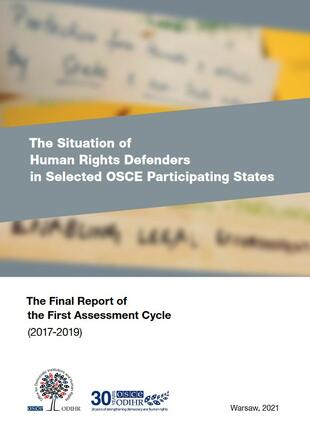
The objective of this initiative was to examine the situation of defenders in selected OSCE participating States in the context of their legal and political obligations, as set out in OSCE commitments and other international standards, and as elaborated in the ODIHR Guidelines on the Protection of Human Rights Defenders.
The report outlines a range of positive measures and mechanisms adopted by the five countries to protect human rights defenders, as well as challenges in this area that remain to be addressed. Based on findings, in the report ODIHR offers recommendations to 57 OSCE participating States on how to strengthen the protection of defenders.
The findings of ODIHR’s assessment, as summarized in this report, also facilitate sharing of good practices in the protection of human rights defenders across the OSCE region.
Identified good practices primarily include measures aimed at ensuring better accountability for abuses targeting human rights defenders, as well as policies, programmes and mechanisms seeking to offer them targeted protection. For example, in some OSCE participating States, the system of physical protection by police of at-risk defenders, including journalists, was
identified as a positive practice.
Advanced measures are also being undertaken in several participating States to protect human rights defenders at risk from third countries, including in the framework of the Shelter City initiative.
Tags: Human rights Czech Republic Italy Montenegro GeorgiaThe content of this article can be used according to the terms of Creative Commons: Attribution-NonCommercial 4.0 International (CC BY-NC 4.0) . To do so use the the wording "this article was originally published on the Resource Centre on Media Freedom in Europe" including a direct active link to the original article page.

